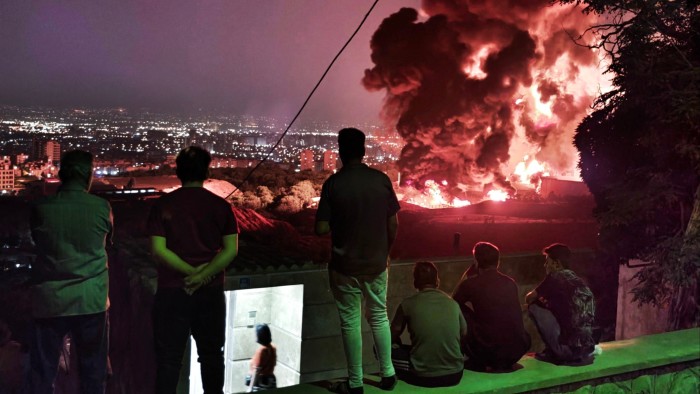Unlock the Editor’s Digest for free
Roula Khalaf, Editor of the FT, selects her favourite stories in this weekly newsletter.
A series of Israeli attacks on Iran’s oil and gas facilities is threatening further turmoil for markets, as concerns grow of escalation in a region that holds half of the world’s oil reserves.
What was hit?
On Saturday, Israel hit two gas processing facilities on Iran’s south coast that process gas from South Pars, the world’s largest natural gasfield.
South Pars extends for nearly 4,000 sq miles underneath the Persian Gulf to Qatar, where it is called the North Field.
One of the field’s offshore platforms paused production after the attack, but was reported to be unaffected. The facilities take gas from the field and process it into methane for domestic use, as well as liquefied petroleum gas (LPG) and ethane, a feedstock for petrochemical plants.
Israel also attacked the Shahran fuel and gasoline depot, in a middle-class neighbourhood in north Tehran, and storage tanks in Shahr Rey in the south of the city.
The Shana news agency reported that the situation at the South Pars field and at the oil depots in Tehran was “fully under control”. It added that the level of fuel in the Tehran facilities “was low” at the time of the attack.
It quoted a spokesperson for the Tehran fire department saying that the fires seen in Shahran were not caused by a gasoline explosion but another unnamed oil derivative.
Officials at the Shahid Tondguyan petrochemical plant and the Tabriz oil refinery both denied that they had been attacked.
What is the impact?
The attacks suggest Israel is attempting to weaken and disrupt Iran’s domestic gas and fuel supply chains to cause shortages, rather than pursuing the country’s oil and gas production or exports, which would rock the markets.
The country’s largest refinery is at Abadan, near the border with Iraq at the mouth of the Persian Gulf, which can process 500,000 barrels of crude oil a day.

What are the implications for energy markets?
While there has been no impact so far on Iran’s oil exports, the escalation of the conflict to energy infrastructure is likely to worry investors. The concern is that Iran may retaliate either by striking energy targets in other Gulf countries, such as Saudi Arabia and the United Arab Emirates, or by impeding the flow of oil and gas through the Strait of Hormuz, the narrow waterway separating Iran from the Gulf states, through which a third of the world’s seaborne oil passes.
The oil market has been closed over the weekend and reopens on Monday morning in Asia.
How might the Iranians retaliate?
Israel’s own energy infrastructure is vulnerable. On Sunday, Bazan, the operator of one of Israel’s largest oil refineries in Haifa, said pipelines and transmission lines to the complex in the northern port city had been damaged by Iranian missile attacks.
It said the refinery continues to operate but some “downstream facilities in the complex have been shut down”. It said there had not been any injuries or casualties. Bazan’s share price fell 1.3 per cent in morning trading on Sunday.

Israel has also shut down its Karish and Leviathan gasfields as a precautionary measure, although other gasfields remain in operation. The country’s electricity grid is not connected to its neighbours and Israel relies on natural gas for about 70 per cent of its power generation.
Meanwhile, Iran has in the past repeatedly threatened to close the Strait of Hormuz. Most analysts believe this is extremely unlikely, since it would upset all the countries in the region that rely on the route and China, Iran’s largest customer for its oil.
So far, there has been little sign of disruption, but Iran could begin to target specific ships passing through the strait. In April 2024, Iranian commandos boarded and seized the MSC Aries, a container ship it claimed was linked to Israel.









